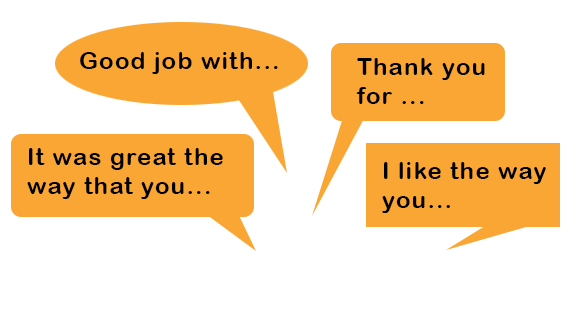With the new year already underway, you hopefully have had a chance to make a few meaningful changes to make life a little less hectic so that you can enjoy the moments with coworkers, friends, and family more. And, if you’ve started the new year without knowing exactly what goal you would like to consider to be a better leader for the new year, consider this one: be more specific. This really resonated with me while reading one of Shari Harley’s blog posts on being specific with feedback. The great thing is that this goal doesn’t add more tasks to your to-do list or require you to sit through a six-hour seminar. Let’s break it down.
Be Specific with Feedback
One of the main jobs you have as a leader is communicating with others, both of what you expect and in providing feedback. Here is where the goal of being more specific comes in to play and can make a big difference with your staff (and really, anyone you interact with). We are pretty good about communicating what we want, but tend to do less well when it comes to giving specific feedback or clarifying what we are saying thank you for. For example, instead of saying something like “Nice job, Bruce, on the PEIMS report to principals,” try making it more specific such as “Nice job, Bruce, on simplifying the PEIMS data and making it more meaningful for principals by breaking it up into the subgroups. That will help them understand the data better and make better decisions sooner.”
As you make your feedback more specific, you are affirming your employee of specific skills and/or thinking that you value and would like repeated. In doing so, it also helps you become more aware of the value your staff bring to the department in serving students. Another example of specific feedback examples could be instead of saying, “Great job on the trouble tickets, Carl,” try saying something like “I noticed the average time to resolve trouble tickets has dropped some. I’d like to hear about what you are doing differently that is making the positive impact.” This allows the employee to know that you recognize the improvement even if you aren’t aware of the details of what was done to bring it about…and that you are interested in learning more about what your employee does.
Be Specific When Saying Thank You
Being specific while saying “Thank you” can make your communication more meaningful. I was once talking with a friend when my boss passed by and said a generic “Thank you” to me. I grinned, nodded, and said “No problem.” My friend asked what I did to get the appreciation. Sadly, though, I wasn’t sure, so I just shrugged and said “Beats me.” There were several things that I think my boss could have been referencing. But without any specifics, I was left in that ambiguous moment of not knowing what exactly I did that was meaningful enough for my boss to make a point of saying thank you. Being more specific would have been helpful (and meaningful), especially if my boss had said something like “Thank you, Bruce, for following up with that principal for me on the use of that new app. She said you really helped her.” Similar to giving specific feedback as mentioned in the previous paragraph, being specific when we say thank you allows the other person to know specifically what you appreciated (and what you want to see more of).
As you seek to be more specific in your communication, let us know how it goes. We’d love for you to share of a time when someone shared specific feedback or a specific thank you with you. In the meantime, keep looking for opportunities to make a difference in the lives of those you lead.

